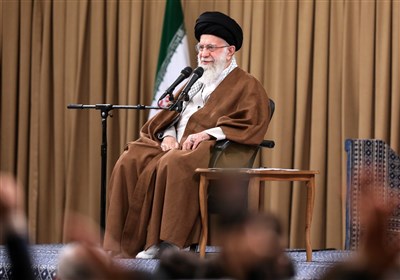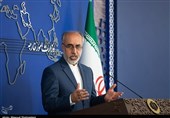UN Rights Expert Urges Global Action over Israel’s Land Grab
TEHRAN (Tasnim) – A United Nations rights expert condemned the Israeli regime for violating the rights of the Palestinian people and settlement construction in the occupied Palestinian territories, urging the international community to take action against the regime’s expansionist policies.
“In terms of bringing the occupation and its array of human rights violations to an end, the international community has to go beyond the adoption of resolutions, the hosting of conferences and the issuing of statements of concern and criticism. The international community has a range of diplomatic and legal remedies within its power to devise and impose in these circumstances, which it applied in the circumstances of southern Africa, among others areas of crisis, in the 1970s and 1980s,” Michael Lynk, the UN Special Rapporteur on situation of human rights in the Palestinian Territory, said in an exclusive interview with the Tasnim News Agency.
He added, “Israel’s settlement activities are in clear violation of international law. They constitute a grave breach of the 4th Geneva Convention, and they are a presumptive breach of the 1998 Statute of Rome.”
Michael Lynk is Associate Professor at the Faculty of Law, Western University, in London, Ontario. He joined the Faculty in 1999, and has taught courses in labour, human rights, disability, constitutional and administrative law. He served as Associate Dean of the Faculty between 2008-11.
Following is the full text of the interview:
Tasnim: On March 21, you presented a report to the UN rights council during the Geneva-based body’s mandated session on Israel, known as Agenda Item Seven, and charged Israel with “the subjugation of [Palestinians’] humanity” and intensifying a crackdown on human rights campaigners. Kindly explain on this and let our audience know about your reasons.
Lynk: My report focused on the plight of human rights defenders working on issues related to the human rights situation in the Occupied Palestinian Territory (OPT). These organizations – Palestinian, Israeli and international – work under increasingly difficult and restricted circumstances, and are attacked regularly by the Israeli government, by private nationalist Israeli groups and by persons unknown. In the conclusion of my report, I mention that human rights violations are closely tied to the 50 year old occupation: to continue an occupation for five decades, against the strong wishes of the occupied people, necessarily entails a host of repressive measures by the occupying power, including “the subjugation of the humanity of the Other”. By this, I mean that the rights of the Palestinians and their humanity are either denied or forgotten in the eyes of the occupying power and its supporters. This helps to explain how human rights becomes relegated, and a people’s intrinsic humanity becomes discarded, in these circumstances.
Tasnim: Your findings were issued days after a senior United Nations official, Rima Khalaf, resigned due to coercive measures used against her to withdraw a UN report in which she had accused Israel of imposing an apartheid regime on Palestinians. She also called on UN Secretary General Antonio Guterres “to do what is right, reinstate the ESCWA report and undertake serious and concrete measures to hold Israel accountable for its persistent violations of international law and human rights.” What is your take on this? In your opinion, what was the reason behind the removal of the report?
Lynk: This matter lies outside of my mandate. I have no opinion on this.
Tasnim: Later, the Palestine Liberation Organization (PLO) said the UN move showed that it is biased towards Israel. Do you believe so?
Lynk: That matter is for the diplomats to consider. I have no opinion on this.
Tasnim: Everyone knows that Palestinians have been suffering from Israel’s racist policies for a long time. What should the international community, including the UN, do in order to stop this?
Lynk: In terms of bringing the occupation and its array of human rights violations to an end, the international community has to go beyond the adoption of resolutions, the hosting of conferences and the issuing of statements of concern and criticism. The international community has a range of diplomatic and legal remedies within its power to devise and impose in these circumstances, which it applied in the circumstances of southern Africa, among others areas of crisis, in the 1970s and 1980s. Among other options, it could seek the opinion of the International Court of Justice as to whether the occupation is still lawful under international law and, if it is not, what are the obligations of the international community to act in concert to bring the occupation to a resolute close and secure the right to self-determination for the Palestinian people. A 50 year-old occupation is an intolerable length of time, the occupation is becoming even more entrenched and the standard responses for the international community with respect to the occupation are not working.
Tasnim: In the absence of real moves to push Tel Aviv to stop its anti-Palestinian policies, Israel has found an opportunity to speed up its settlement activities without being concerned about any condemnation from world powers. Israel thinks it is above the international law. Back in December, the UN Security Council passed a resolution condemning Israeli settlement construction, but Israel defied the document by building new settler units in occupied territories. What do you think about Israel's settlement activities?
Lynk: Israel’s settlement activities are in clear violation of international law. They constitute a grave breach of the 4th Geneva Convention, and they are a presumptive breach of the 1998 Statute of Rome. As well, they defy world opinion: the UNSC and the UNGA have adopted numerous and very clearly worded resolutions instructing Israel to cease all settlement activities and to end the settlement enterprise, and Israel has steadfastly defied and ignored these resolutions. As important as these resolutions are to restate international law and to remind Israel of its obligations, they are clearly insufficient to bring this untenable situation to a close. For the reasons stated above, more is now required of the international community to draw a firm line in the sand and to seek to elevate its response to the occupying power’s defiance of international law.
International law is the promise that all countries make to one another to uphold and respect our modern world order, and to reform it in an ordered and liberal fashion. Benjamin Barber once wrote that legal exceptionalism – the concept that the rules and laws do not apply to you – fails the test not only of legality but also the test of realism. No country can base its domestic or foreign policies in special reasoning that is forbidden to others. That path leads to international anarchy.





